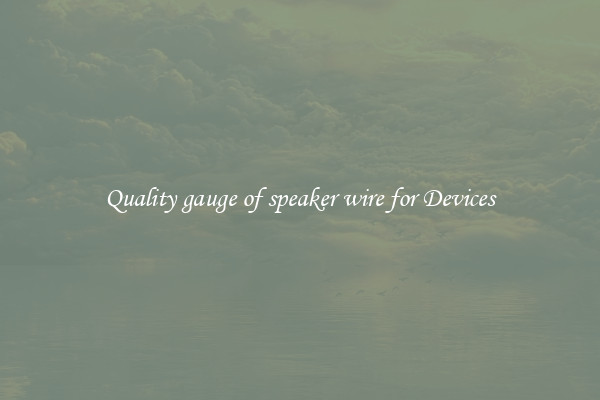Quality gauge of speaker wire for Devices
When it comes to setting up a home theater system or enhancing the sound quality of your audio devices, the choice of speaker wire is often overlooked. However, it plays a crucial role in delivering optimum audio performance. A high-quality gauge of speaker wire can make a significant difference in the audio experience and help achieve a more immersive and enjoyable sound.

One of the primary factors to consider while selecting speaker wire is its gauge or thickness. The gauge of the wire refers to the thickness of the conductor inside it. Generally, speaker wire gauges range from 12 to 18, with 12 being the thickest and 18 being the thinnest. Thicker wire gauges have lower resistance, which means they can carry more current and deliver better audio quality.
For devices that require a higher wattage, such as amplifiers or home theater systems, it is recommended to use a lower gauge wire. This is because high wattage demands thicker wire to minimize resistance and ensure efficient power transfer. Thicker wire gauges can handle more current without overheating or causing signal loss. Using a low gauge wire in such devices will prevent distortion, providing you with cleaner and more accurate sound reproduction.
On the other hand, for devices with lower wattage requirements, such as bookshelf speakers or computer speakers, a higher gauge wire would suffice. These devices usually operate at lower power levels, so using thicker wire may not provide any noticeable benefits. In such cases, opting for a higher gauge wire can be cost-effective without compromising much on audio quality.
Apart from gauge, it is essential to consider other factors like material and build quality. Copper wire is the most common and preferred choice for speaker wire due to its excellent conductivity. It ensures that the audio signal remains uninterrupted while traveling from the amplifier to the speakers. Furthermore, wires with high-quality insulation and shielding help in preventing interference from neighboring electronic devices or radio frequencies, providing a cleaner signal transmission.
It is worth noting that excessive wire lengths can also affect audio quality. As wire length increases, so does the resistance, causing a drop in signal strength. It is advisable to keep speaker wire lengths as short as possible, especially for devices that require high wattage.
In conclusion, while selecting a gauge of speaker wire, it is crucial to consider the wattage requirements of your devices. For high-power devices like amplifiers or home theater systems, a lower gauge wire is recommended to ensure efficient power transfer and better sound quality. For smaller speakers or devices with lower wattage, a higher gauge wire can be a cost-effective option. Ensure using high-quality copper wire with good insulation and shielding to prevent interference. By selecting the appropriate gauge of speaker wire, you can enhance your audio experience and enjoy crisp and immersive sound from your devices.

View details

View details

View details

View details








